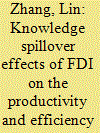| Srl | Item |
| 1 |
ID:
141342


|
|
|
|
|
| Summary/Abstract |
Anti-dumping as a new protectionist trade policy has evolved as the popular strategy choice for the trading nations. Since the Uruguay Round of World Trade Organization (WTO) (1994), India has been a prominent user of it. This article attempts to explore the possible factors that might have triggered off 90 percent cases of anti-dumping by five major Indian manufacturing industries over the period 1997–2011. We construct a balanced panel combining data on anti-dumping initiations from the ‘Global Antidumping Database’ with trade data from the Directorate General of Commercial Intelligence and Statistics (DGCI&S)-India and United Nations Comtrade database at the Indian Trade Classification (ITC) based on Harmonized System (HS) two-digit level. Having count data, the empirical model is estimated initially through a random-effects Poisson regression model followed by a negative binomial model. The number of anti-dumping initiations in India is dependent on the value of imports, the presence of a dominant industry lobby and the retaliatory behaviour by the affected domestic firms, among some others. In fact, we find that in determining the number of anti-dumping initiations the conventional economic and foreign affairs policies take a backseat!
|
|
|
|
|
|
|
|
|
|
|
|
|
|
|
|
| 2 |
ID:
155773


|
|
|
|
|
| Summary/Abstract |
This article presents and examines a model of legalization on an original dataset of informal Canadian–US defence and security arrangements (DSA) formed between 1955 and 2005. Non-treaty arrangements permit US presidents to bypass Senate ratification, resulting in expediency and secrecy, both assets in defence and security relations. That withstanding, informal arrangements contain provisions responding to certain strategic problems. They detail aspects of legalization: delegation; obligations; and precision. Leaders select informal arrangements to incur fewer public commitments, but design them to ensure credibility. In that context, what factors shape informal DSA legalization? Propositions developed from delegation and rational institutionalist arguments identify the factors influencing informal DSA legalization. The Canada–US case is germane due to its “rules-based” nature and heterogeneity. An original dataset of the legal design of eighty-two bilateral DSA is introduced and analyzed. Results confirm cabinet shuffles and unified governments decrease DSA legalization while Democrat presidents and rising military threats increase it.
|
|
|
|
|
|
|
|
|
|
|
|
|
|
|
|
| 3 |
ID:
193000


|
|
|
|
|
| Summary/Abstract |
The economic impact of the geographical rotation of local officials is important in China's official management system. This study used a zero-inflated Poisson regression model and found that the geographical rotation of local officials significantly increased cross-city mergers and acquisitions (M&As) of enterprises. The impact of local officials' geographical rotation on M&As was more pronounced under certain conditions. These conditions included: (i) when officials were transferred from cities with a higher development level to cities with a lower development level; (ii) when the outflow cities were municipalities directly governed by the central government, provincial capitals, or separately listed cities; (iii) when the transfers of officials occurred within the same province; (iv) when the transfers took place before 2012; and (v) when the transfers happened in the years following significant central government conferences, which provided strong political incentives for M&As.
|
|
|
|
|
|
|
|
|
|
|
|
|
|
|
|
| 4 |
ID:
159018


|
|
|
|
|
| Summary/Abstract |
As China is moving toward an innovation-driven economy, this paper offers new insights for both policymakers and investors to optimize the effectiveness of investment performance. This paper studies China's provincial research activities with a focus on the spillover-induced productivity and efficiency change. The results show that spillovers as a result of inflow of foreign investment contribute positively to the performance of overall research activities, however, the productivity effects vary across regions. Our analysis also indicates that highly skewed distribution of FDI leads to a less improved innovation efficiency in FDI-rich provinces. Future innovation policy should adjust the investment profiles based on the preferential innovation output on one hand, and optimize the complementary policy for FDI on the other hand to reduce inefficiency and the potential negative effects of knowledge spillovers. Inter-provincial governmental cooperation is necessary to resolve the uneven distribution of FDI and improve the innovation efficiency in both FDI-poor and rich regions.
|
|
|
|
|
|
|
|
|
|
|
|
|
|
|
|